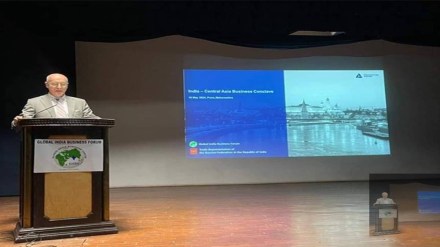At the recently concluded India-Central Asia Business Conclave in Pune, the focus was on the prospects of cooperation within the framework of the Eurasian Economic Union (EAEU) and India.
The conference served as a platform for discussing the advancement of trade and economic collaboration among the nations of Central and South Asia. Key topics included exploring avenues for enhancing bilateral trade relations and fostering economic partnerships.
Alexander Rybas, the Trade Representative of the Russian Federation in India, participated in the Conclave held by the Global India Business Forum last week on May 18, 2024.
This Conclave drew the attention of diplomatic missions from various countries, including Azerbaijan, Armenia, Belarus, Georgia, Iran, Kazakhstan, Kyrgyzstan, Mongolia, Uzbekistan, Tajikistan, and Turkmenistan.
Rybas’s presence at the conference highlighted Russia’s commitment to strengthening its ties with India and fostering regional economic integration. His participation underscored the importance of multilateral engagements in promoting mutual prosperity and sustainable development.
During the one day meet, the delegates exchanged insights, explored potential areas of synergy, and chart a course for future cooperation. By fostering dialogue and cooperation among participating nations, the conference aimed to stimulate economic growth, enhance regional connectivity, and promote stability in the region.
India to Begin Talks for FTA
India is gearing up to initiate negotiations for a free trade agreement (FTA) with the Eurasian Economic Union (EAEU), led by Russia. The move aims to bolster trade relations between the two regions, potentially unlocking new economic opportunities.
Russia, Armenia, Belarus, Kazakhstan, and Kyrgyzstan form the EAEU. Recently, ahead of formal negotiations, both India and the EAEU have exchanged trade data, laying the groundwork for discussions. The discussions will commence once India’s new government assumes office. This development comes amidst Russia facing sanctions from major Western economies following its actions in Ukraine, which have had repercussions on its trade and economy.
The proposed FTA holds the promise of enhancing India’s exports to Russia. Currently, India imports significantly more from Russia than it exports. In the fiscal year 2023-24, India’s exports to Russia totaled US$4.26 billion, whereas imports amounted to US$61.42 billion. Major imports from Russia include crude oil, petroleum products, coal, and fertilizers, while top Indian exports to Russia comprise pharmaceuticals, iron & steel, and electronic machinery.
India is also actively pursuing FTAs with other major economies worldwide. According to a recent report by the Global Trade Research Initiative (GTRI), India aims to establish FTAs with key trading partners by 2024-25. Recently, at an event Foreign Minister S Jaishankar emphasized the long-term nature of the increasing trade with Russia, highlighting emerging economic opportunities between the two nations. He underscored that the surge in trade and the identification of new areas for cooperation should not be viewed as transient, indicating a broader trajectory of economic engagement between India and Russia.
The forthcoming negotiations between India and the EAEU underscore a strategic effort to strengthen economic ties and explore avenues for mutual growth.
